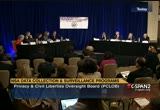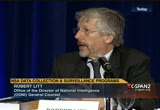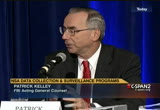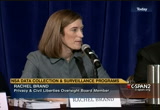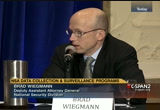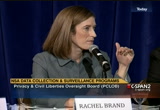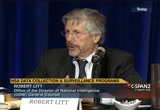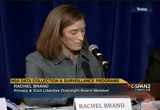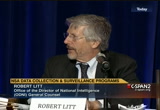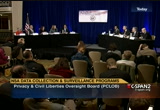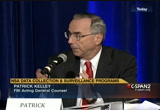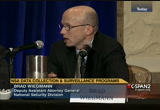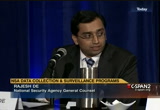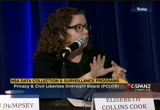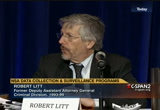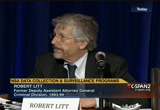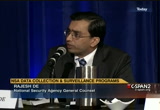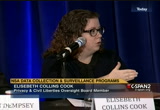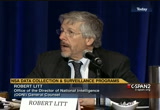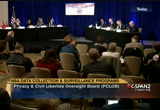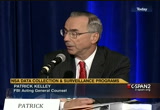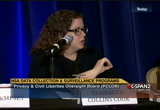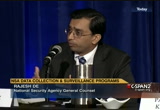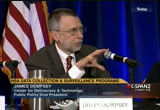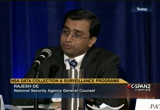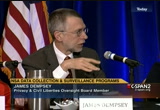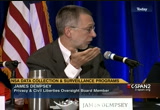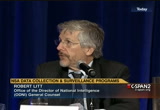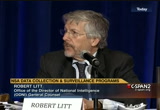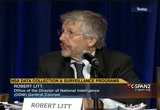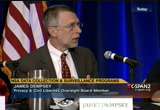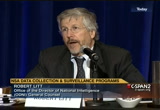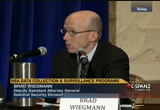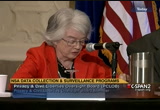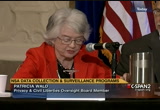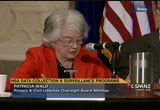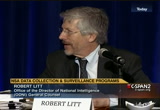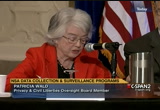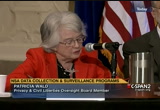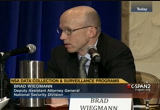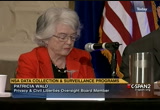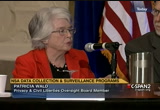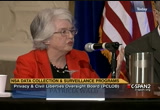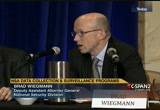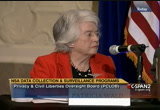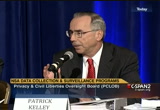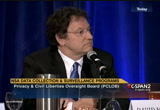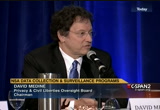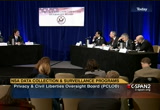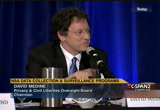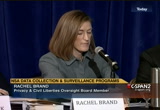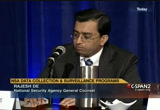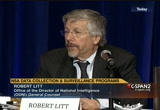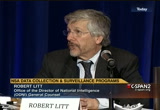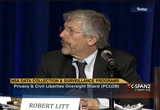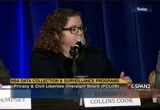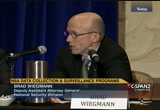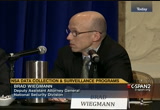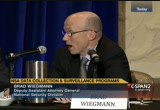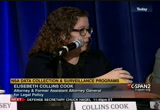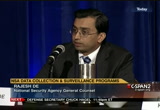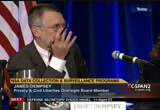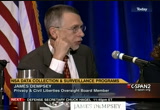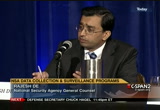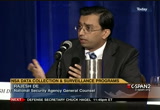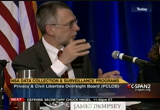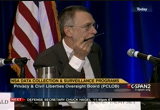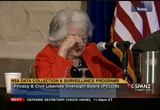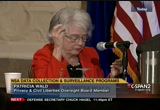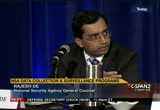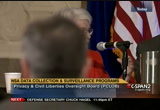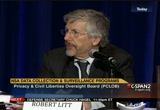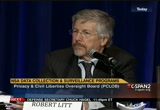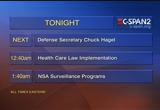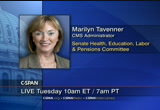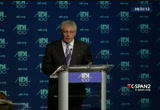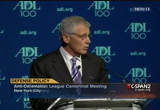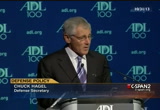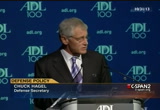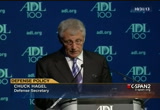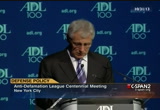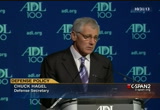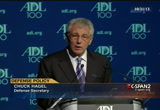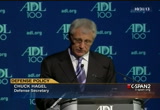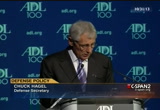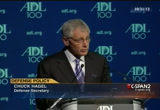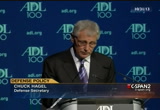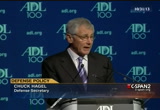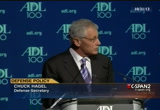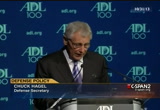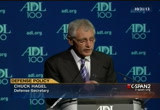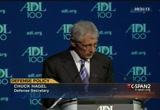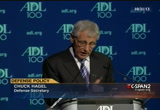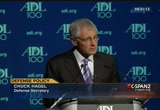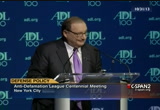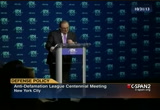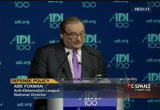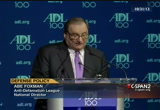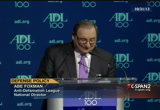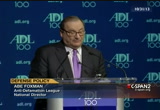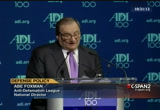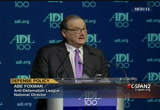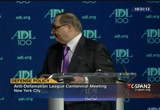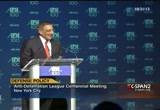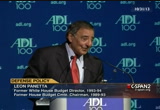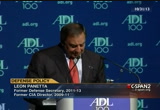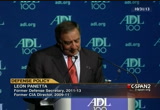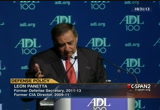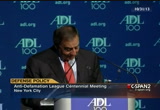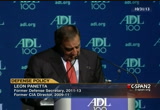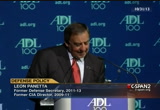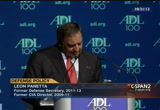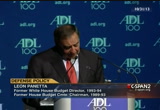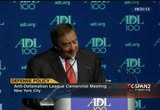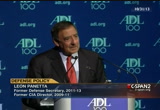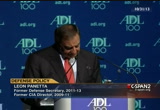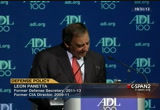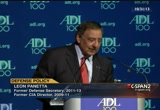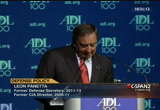tv Key Capitol Hill Hearings CSPAN November 4, 2013 10:30pm-12:31am EST
10:30 pm
back to 215 now. bob, you said there were certain, in response to the question about what proposals the administration could expect, there's transparency proposals we couldn't do. what ones are those? >> well, in the absence of interagency clearance and omb approval, i'm reluck at that particular time to state positions on any proposal. >> what do you think you can do? >> i think proposals, for example, that require us to count things that we are not now counting and that might be difficult to count present problems for us. if, you know, for example, i don't know if there's such a proposal, but if there was a proposal that says tell us the number of u.s. person telephone numbers that could be a difficult thing to accomplish because we don't go out and count that.
10:31 pm
things that impose burdens on us like that might be the sort of thing that presents problems for us. i'm not speaking, again, not speaking with respect to any proposal, but that's the kind of consideration we take into account. >> okay. i'm going to -- go ahead, go ahead. >> a point on that, again, not talking or addressing any specific proposal, but if we were required to for a provider to disclose the number of orders served on them, that gives the adversaries ad go ahead indicators, perhaps, depending on the relative numbers whether to use that service provider or not, and it's difficult to accept. >> if i may add to that, one thing the pam is aware of, the
10:32 pm
dni announced a annual report of the number of orders issued under various provisions of fisa and the number of targets affected. the executive branch is trying to the extent possible to take steps towards transparency to be taken consistent with operational effectiveness to delineate the number of orders and targets expected by fisa orders with probable cause, section 2 # is a, orders under 702 of fisa, ect.. >> i want to follow up on return requirement of selectors to the fisk. that sounds like a good idea in the abstract, but i'm unclear what exactly it would add in and, for example, you provide a
10:33 pm
list of selectors to the court along with some documentation, and i would be interested to hear what it would be, and what would the court do with the information? >> i'll defer to brad on the second part of that, but documentation, today, we keep that of the factual -- there's oversight mechanisms, but as to how they handle that, i'll bever to brad, the justice department requires that before the fifing. >> okay. >> [inaudible] >> one option would be -- compliance problems on its own, then it could call in the government saying it's not how -- [inaudible] >> i think there's something wrong with brad's microphone. i don't know what to do about that.
10:34 pm
>> we report those to the court and information could be purged, the court could respond if we have a compliance incident and order relief. they could suspend the operation of the order, suspend the program, take whatever remedial steps that they thought appropriate in order to enforce requirements of the order. this could be the same mechanism, but there would be intermediary in between. >> i was wondering -- >> they could independently review the information. >> that's what i'm getting at. not exactly what the court would do with a compliance problem, but how to figure out if there is a problem, if you expect them to be literally looking at every route selector, assessing whether the evidence justifies
10:35 pm
the determination or what. >> so we're not talking about thousands and thousands, but there may have been an outside assess want of are we, in fact, applying the standard appropriately? it seems to me a judge could look at in the same way that judges litigate the stops by the police, was the information sufficient to former reasonable and articulate suspicion to support stop and frisk, a judge could look at the documentation that nsa has and say are you making -- are you setting the line in the right place, are you -- are your people, do your people, in fact, understand what
10:36 pm
the standard is, and are they applying it appropriately, and if a judge felt that they were either being setting too high a standard or too low a standard, the judge could provide that feedback along with whatever remedial matters congress deemed appropriate. >> is that, you know, tell me if we have to talk about it in another setting, but in the return requirement, the wiretaps, does the information return to it under that provision? >> i'd have to get back to you on that. i don't know the answer to that. >> okay, if you would get back to that. i wanted to ask about a provision in the leahy bill, but first it adds the words "material" to a fisa investigation and limits 2 # 15 to being used for seeking
10:37 pm
information to a foreign power or agent of a foreign power, activities of a suspected foreign power or someone in contact with her nope to a suspected agent of a foreign power so you may not have an official administration position on this yet, but i want to ask anyway in extent that you can. what do the words "material" add? what does a court do with that? >> i have the same question as i read the bill over the weekend. i'm not sure what the intent is. i think you have to ask the chairman. i think the obvious intent is to try to -- i think it's no secret that the sponsors of the bill want to eliminate the collection program, and the intent of the language they propose is to prevent bulk collection. how it accomplishes that, i'm not entirely sure. >> do you have aceps of what evidence you present to the court to establish materiality that's additional to or
10:38 pm
different from what establishes relevance? any of you? >> i -- i'm not sure how it would be different. >> and then can you address the other limitations, the three categories of information that would be allowed, and how that would impact investigations since this would no longer be like the current 215, a general subpoena authority under fisa. >> i think that the purpose of this pertain to language is i believe the intent is to try to ensure queries, that business records can only be obtain with respect to identified individuals. i think that's what their intelligence is here and for the reasons we previously discussed, that essentially would shut down the program. >> how would it affect, though, individuals sort of run of the mill 2 # -- 215 order, or would it? does it just affect bulk collection or everyday 215 applications? >> well, i think from our
10:39 pm
perspective, the proposal is in the sense that we have the presumption of we know the person that we're after, and with terrorism prevention, we don't know who we are after. if we are limited to seeking numbers from unknown, we're not effective. again, it bears repeating we connect the dots here so the fewer dots we have, the fewer connections we make. again, i don't think thatted 340d eel works. i think given the type of data we're talking about that is susceptible to an lit call connectivity, unlike other types of business records, then we need large volumes of the data in order to make connections so whether we are changing the standard from relevant to
10:40 pm
relevant inmaterial or saying there has to be a connection to someone who is known, you are reducing the amount of data available to take connections we have to make. >> so just to add to that, it's important to recognize the changes apply not just to the bulk collection but regular 215 orders, and people are forgetting the authority used in the bulk cop text that the predominant use of the authority is to obtain individual records in a more targeted way, and this changes the standard closer to the prepatriot standard rather than a broad standard and flexibility talked about. in the ordinary case where you want hotel records or car rental records or whatever that might be relevant to your invs. gages, you'd have to meet that higher showing in order to get regular records that are targeted investigations so there's a collateral impact on ordinary 215 orders that have nothing to do with the activities that are
10:41 pm
current subject of controversy. >> thank you. >> going back to what you talked about with the information disclosing in terms of the types of -- i think you said "target" which i understand any electronic surveillance context where the statute specifically talks about target of surveillance, what does that mean for section 215? >> so right now, the dni has a process how can we best articulate that language in a way that's meaningful to the public? obviously, in the context of 215, we have one order, but it involves quite a significant amount of records. we want to make sure we provide some information that is useful and, in fact, transparent in some way, and the same sort of analysis is happening with respect to section 702 as well. how do we -- what's the best means to provide insight into orders and targets affected, but at the same time preserve the sort of national security needs we need to so that process is
10:42 pm
underway and the dni is leading that. >> i guess i wanted to follow up. there's been a lot of discussion about the ability of private sector, i will call them partners, and their ability to disclose on a company by company basis their cooperation with the government. do you think that there are proposals out there that would be advisable or feasible? >> so, first of all, this is a matter that currently is in litigation, as you know. there are papers that have been filed articulating positions of the companies and of the government on this -- >> putting aside whether or not it's permissible under the current regime? whether there's a statutory regime that would be advisable or feasible. >> again, i think the point is that we -- the proposal that
10:43 pm
we've articulated would allow, on the one hand, a government -- for the public to know on the one hand on a government-wide basis how much various authorities are used, and number two, and they are turning over information about their subscribers to the government, and where we start to have a problem is, as pat said, when you allow the companies to break down on an authority by authority basis of what they are providing because that starts to give a lot more granularity about what our capabilities are against particular platforms given the kind of authorities that we are exercising, and if, all of the sudden, a company has not had a large number of title 1 fisas, has a spike in fisas,
10:44 pm
that's going to be noticed by the adversaries leading them to shift away from that provider. the flip side is on the viewpoint of public transparency, what's important to the subscriber is to know how often is the government going to get my information, and in particular, i think, frankly, from our perspective, how rarely it happens compared to the overall number of subscribers that the number of sub vibers of the services, the percentage whose information is provided to the government is a minuscule fraction taking intoing the all government -- taking into account all government authorities together. the information is not broken down in a level of detail that would enable people to avoid surveillance. >> so following up on a couple questions that came up in the
10:45 pm
discussion of alternative means for accomplishing the the section 215 program or something approaching that program. how much do you assess the program? ab sent the public disclosure or the need to opine on legislative proposals, how much are you internally considering ways to do programs through means that raise fewer privacy concerns? >> well, let me speak first to that. i think it is a very valid and reasonable question of the intelligence community generally and nsa in particular as to how often programs are reevaluated, and on what sort of rigorous schedule does that happen? as i mentioned earlier, there's natural points in which that happens whether it's in the context of congressional reauthorizations, whether it's in the context of budget
10:46 pm
decisions to be made. and, frankly, it happens every day in the cop text of the assessments. whether there's a more focused process of reporting requirements, that's something we should be thinking about. >> so following up on something that pat asked earlier and one of the themes that she was hitting, do you think this discussion today and the amount of information that is currently, publicly available about the section 215 program is predictive of our ability to have a similar conversation about other programs whether they are current or future. that's probably to brad or to bob. >> i guess i'm trying to understand the question. >> i think we've heard a few
10:47 pm
times that the fact we're having this hearing or the fact that the government rational is public, and certain orders and accompanying materials have been made public demonstrate that we could have this type of discussion about anything whether current or future. do you think that that is logical or correct? >> so i can start by recounting the story that may or may not be with those who was asked what he thought about the french revolution, and his answer was, it's too soon to tell. that's true here. it's too soon to tell, really, what the effect of the disclosures is going to be. we, in the intelligence community, we are always looking at risks. what's the risk that is out in
10:48 pm
the public, there's going to be damage. it's unquestionably and ire refutably true that if information about -- if information about how we collect intelligence becomes public, it provides an opportunity for our adversaries to avoid that. will they take advantage of that? we will only know over an extended period of time whether that's the case or not. we may never know for certain. we may only see certain kinds of information dry up without having somebody post a sign that says we're no longer doing this because we know the united states can collect this. >> i'll just follow up. the fbi headquarters, look in the courtyard, there's a saying on the wall there saying the most effective weapon against crime, including terrorism, is cooperation. cooperation of the public. we rely on the public. we want the public.
10:49 pm
we need the public. it's our fbi, but it's their fbi as well. it's important for us, therefore, to be sure that we understand what the -- where the lines are, and we want to go right up to the line, but we don't want to cross the line. the debate is helpful, but at the same time, as bob indicated, we have a process in place for that debate, all three branches of government looked at the 215 program, and said it was okay. it took an up authorized disclosure to bring about this discussion, and we don't fear the discussion. we think that the american public is somebody we'd like to have a discussion about, but it's the adversaries we're concerned about because for every disclosure that the public has, the american public have, the adversaries have it as well. if we stick within the established channels to have the discussion to protect the things that need to be secret, then we, i think, institutionally and
10:50 pm
individually are better off. >> if i could add -- i think to your question, just asked the logical questions we're having, debate and discussion today, does that mean that the program never should have been classified, clearly, that's not true. for the reasons bob articulated. we don't know the harms yet, and harm could be happening today. given the disclosure happened and the harms affected are aphak waited, there's an attempt under the circumstances, and to that point, i think it's certainly possible to think that greater public discourse about intelligence matters is a good thing without thinking that it took an illegal agent to expose lawful program. in and of itself is a goo thing. >> one final question for you in this round. you referred to minimization procedures and their collection retention, desemination use. is this an example of a
10:51 pm
collection minimization requirement? that's something you look to the typical title 3 context, and traditionally, folks stop listening when you heard someone who was not a target and you took the head phones off and how that translates into the national security context. >> let me try to address it in a little more of a general sense and perhaps in a classified sense to get into the more technical details. i think here we're talking about where collection is directed, how collection is directed, the technical means by which it's affected, and there's a range of mechanisms in order to minimize to the extent possible, minimize accidental collection of information on the front end as much as feasible given the imperative of doing the collection in the first place and then there are -- we take, as you eluded to, we take steps that are steps possible at every stage in the process, not just collection, but during use of
10:52 pm
information, analysis, and retings of information. >> if i could add another sort of conceptual type of minimization procedure at the collection end in this regard is that in a number of areas, there's heightened requirements of approval and legal review before collection is undertaken against u.s. person. >> mr. dempsey? >> thanks. i have a question about the relationship between the government and communication service providers, particularly in the sort of world of globalized information services and american companies providing services to people around the world. do you agree that it's important that there be an arms length relationship between the government and the service providers, and there be a perception, a reality of the arms length relationship, and that there be a perception of
10:53 pm
the arms length relationship? >> yes. >> now, i've seen reference to the nsa referring to cooperations as its partners. , service providers as its partners, presumably partners and surveillance. doesn't that undermind the perception of an arms length relationship referring to corporations as the government's partners? can you see how that's misinterpreted as adjusting a close relationship? >> i think this question probably immenses the problem with selective and misleading disclosures generally because, certainly, i review a lot at the regime council at nsa, not every power point, or every single employee's articulation of things, but the term "partnership" is one used across government in a variety of contexts, and so i take your
10:54 pm
point. one doesn't want to leave with the misimpression there's not an arms length relationship between any private and government entity. on the other hand, i think i would caution folks reading too much into particular use of words and any given power point or whatever the basis of the question. >> >> under the 215 program, there's opinions referred to as the corporate store so searches are run with the selectors, and, as i understand it, the tree of data that results from that goes into the salt corporate store where it's not subject to limitations discussedded today in terms of searching. it could be now searched without the limitations.
10:55 pm
there is a quantify cation of how much data is in that corporate store? >> you know, i might have to take that for the record and get back to you. i'm not prepared to speak to it today. going to this question sort of 215, one question is what's next? what could be next? what if the government were to decide they wanted to go back and start using 215 for internet meta data or all of the rationale, or would the rationale for collecting data apply to internet meta data, and
10:56 pm
then would all of the scrolling carry over to that or how would the programs be developed or structured? >> a couple thoughts. first, bear in mind that section 215 requires that you obtain bids records. there has to be records in existence that you are obtaining. the -- as we discussed earlier, the telephone companies keep and maintain data for their own business purposes. that allows us to use 215 to get them. it's not clear to me that the same legal authority could be use with respect to internet service providers. more generally, i think that the fisa court's approval of the use of 215 -- >> just on that, i mean, it's my
10:57 pm
understanding that interpret internet maintains data, sometimes for a short period of time, others a longer period of time, but under the rationale of 215 even holding it for a minute or an hour is enough to -- >> i don't know enough about the technicalities of that, but i'm just saying it's a general limitation on 215, it has to be some sort of document or tangible thing. more generally, the fisa court's approval of the business record collection was based, number one, in part, on a specific showing that was made that the collection of the meta data in bulk was relevant to an investigation, and that the -- and that it had to be collected in bulk in order to be relevant, and we'd have to make that same showing to the fisa court for another category of data. number two, i think that the whole it's may or may not be
10:58 pm
strictly a part of the approval, it was based very much on the limitations and restrictions that were imposed on our ability to use the data. it's not at all clear to me -- we've never made the request, but it's not at all clear to me that the fisa court would have approved a request that said we. to collect all the data to use for whatever purpose we want to without controls or restrictions. i would anticipate if there were another bulk collection program that we wanted to institute, the fisa court would look at the controls that were prepared and the manner in which relevance of the bulk collection was established and template them up against each other to ensure that, in fact, both the statutory standard and fourth amendment were met. >> you know, right now you've got 2 is15 relevance, and that
10:59 pm
covers everything from one guy's hotel reservation in one hotel to potentially every hotel reservation at every hotel of everybody on beginning indefinitely, and all that hinges on relevant. is it possible to biforkate 215, have your more particularized requests under the standard -- explicit in the statute, and then take this set of concepts in limitations that is built up around the data program, and come up specifically with a statute tailored for something which i see as different, the bulk collection, the ongoing collection. >> i think in the abstraight,
11:00 pm
11:01 pm
we have some issues here. if you have other contacts where, let's say computerize data is obtained in a grand jury subpoena or civil discovery, the question is, okay, i want to get a certain amount of data and how broadly can i scoop in order to get the core data i want? and the court say how broadly necessary for you to be able to get the core amount of data. is it necessary to seize the whole computer. there are files on it you can get. the court said you can get the whole computer to get certain information or cases about financial record and some of the thing the government cited in the white paper we published talk talked about the con terks in term of analogies. i think there are analogyies that show that basically you're kind of using a less restrictive
11:02 pm
means test or the means that is necessary to get a larger amount of data in order to get the core amount of da relative to the investigation. that's okay. if you want to codify it and your question is can you segregate the order 215 application from bulk and set up special rule for bulk because it raises different concern? sure. we would to look at that and make sure it met the needs of the programs. absolutely you could do that. >> that's if for this round. >> i want to nail one thing down and make sure i understand it. with the 215 collected meta data which include the ffn meta data for all calls made in the united states, that body of data, as i
11:03 pm
understand it, or if i'm use -- understanding it correctly to the regular dissemination exception in executive order 1233 for any evidence of crime or certain kind of personnel decisions, or quote, understand foreign intelligence, is that right or not? >>. >> you're talking about the bulk collection its. yes, it's subject to those rules but more importantly subject to far more stringent rules inposed by the fed. >> okay. but the actual program as it's put forth by the government would -- the reason i'm asking the question, obviously, because there's been certain perceived unrest or unhappiness among some segment of the public with
11:04 pm
knowing that all of their telephone meta data, though it may be, is out there the. the notion if it's out there but you're not subject to any queery because the number that is queries very small of the one you've reported still question arises, well, would the data. the people who never get queried never get brought to the query system still be subject to these kinds of disclosure. you point out that the court may have interpreted it to require more stringent data. still, am i correct that some of this evidence meta data evidence can be disseminated everyone under the restriction. >> only the result of query.
11:05 pm
>> so -- >> the data -- >> can i just make this clear. because i think it's -- >> yeah. i want to get that clear. >> the bulk data collected can only be dissemnated pursuant to the procedures approve bid the feds. which super seed the more general rules of 1233 in this rather. to the extent that 1233, i mean, 1233 governs everything we do. but with respect this particular collection, the fiscal limitations are more stringent. we can only disseminate queried results. and even the 1233 comes on top 77 that. >> indian that. >> thank you. following up a little bit on the
11:06 pm
necessity question, that jim asked. it's i think it was pointed out in the white paper that came out on the 215 program that it was necessary it was said wide spread a collection was necessary and the necessity fell within the usual form of will being necessary to a quote, authorized investigation including the relevance of necessary toy the technological tool or getting the hay stack as it were rather than exclusively to the more traditional interpretation of what related to authorization investigation means in criminal law or has meant in criminal law as despite what you find about the grand jury cases how far they go on
11:07 pm
that. usually the traditional interpretation was related to an investigation. it's going lead to the actual evidence relating to the subject matter. the investigation. downtown question would be if 215 relevance is teed in part to the technological capacity of your search instrument can that be further expended? if new technology and allow you greater search capacity in this or other bulk programs -- could the, quote, hay stack, be made as big as the technological stools so you to use it or a posed to the more traditional grand jury, which may have had some exceptions but not huge. which related to is it actually going lead to evident area lines
11:08 pm
to some evidence that is relevant to the subject matter? sorry for the wording. i think you know what, i mean. >> your question is changing in technology could allow for different -- >> you said it better than i did. >> it's one of the factors the court looked as is the technology allow means that nsa had available to it. to search the data and how effective they can be in that particular context. yes, as nsa develops new tool or other part of the intelligence community do it would be a factor to consider. it's not a dispositive factor. the fact you have the tools means that automatically ipso facto you have the ability to get the data permit you to get if it leads to the information. you have to look at the other factors the court considered. how important is the necessary? how important is to get it in a larger quality. what is the nature of the
11:09 pm
information. that's a critical factor it's not protected by the fourth amendment. it's just phone numbers. it's not content. that's obviously a key consideration that would not make this program available for other contracts particularly with respect to content information. i don't know if it answers your question. >> yeah. yeah. i think the changes make a difference. >> that's what i was trying to get at. -- as oppose the old fashion method it's going to lead to evidence. that leads in to my -- i think i have time for one more question. that is as i read at the government's legal justification laid out in the paper and some of the material that has been disclosed for the current 215 program has to relies heavily on
11:10 pm
the smith maryland maryland notion that the telephone meta data in that case did not institute a fourth amendment or legally cognitive privacy interest. now, certainly smith v. maryland we recognize is on the books. there have been some inte make of possible future changes in the u.s. c jones case both in the dc circuit and some of the concurrences in the supreme court as well as since smith v. maryland we've had a lot of research pointing out the potential informative value of a lot of meta data on from a person if you can find out really not the content but a lot of meta data on the kind of communications the person had.
11:11 pm
the places they have gone, et. cetera, et. cetera. you're going know as much, in many cases and maybe more in some that you get from the actual content of those communications. suggesting to some that dichotomy is not such a definite one. i guess my basic question is, if in the future, smith v. maryland should be changed to take account or some of these trends are suggested meta data from situations may well have privacy value legal privacy value. would programs like 215 lose their, in your view, lose their legal foundation. their legal legitimacy? >> so, i think that remains to be seen. i understand you're referring to the jones case in the supreme court. i talked about about smith v. maryland. obviously it's fundamental as we
11:12 pm
explained to the analysis of the the court here. the information is not protected by the fourth amendment under smith. it's been shared with the phone company. the basic idea of smith information that a billing record that belongs to the phone company that you have voluntarily exposed to the phone company in making a phone call is not protect bid the fourth amendment to the extent it changes in the future because of changes in technology, changes in how the court perceive privacy in the -- i think remain to be seen. the holding in smith and jones is clear. it was not base order the change. it was bassed on the idea there was a trees pass. about a gps device put on the bumper on the underside of the vehicle and tracking the vehicle -- vehicle in the manner. we don't think jones is controlling or cause a question or current authority. but obviously if there are
11:13 pm
future development in the law those would have to be reevaluated by the fisa court and other courts as they evaluate such a program. >> if i can make one point here which i think is important. there are a lot of academic studies that say you could take meta data and extract a lot of information from it. we aren't allowed to do that. we don't do it. we have a specific limited purpose for which we use the meta data. that's all we're allowed to use it for. i think there would be, as i said earlier, there would be a different situation presented if we asked the fisa court to say we want to get this meta data and do anything we want with it. >> i want to echo the point bob makes. it's important for folks engaged in the public discussion to not conflate the legitimate point you have made. perhaps a great deal could be concerned meta data. but in term of this particular program, it's only for counter
11:14 pm
tropical storm per order of a court. there's no us is scriber information involved. i've heard people spitting out threat one can determine what one doctor visits. one's best friends. for a variety of things in the abstract without any legal policy control in place might be possible. it's not the world we're in with the particular program. >> pointed out the balance of the -- [inaudible] compared to the significant -- the greatest interest of the government in this particular fight against terrorism. we're not talking about local crime. we're not talking about organized crime. we're talking about terrorism where i don't have to say it. there are a lot of compelling national interest at stake. so the government's interest in this particular question is that it's greatest compared to the
11:15 pm
minimum innovation of privacy even if protected usht the fourth amendment. the key question is the outcome reasonable under the constitution a reasonable search, seizure? i think the answer would be yes. >> i think we have time for a question five-minute round. >> a lot of these programs were developed outside the public view. we see there's been a strong public reaction to the program. what steps could be taken to consider privacy and civil liberty concern. how the programs are developed and also public -- we answer to the american public for as we go forward in developing these type of surveillance programs. >> i'm going punt on the question in the sense as you know this is one of the things that the president has asked the intelligence community and you to look at. and i think --
11:16 pm
rather than offer views right now how it could be done. i would say it's a process ongoing and sensitive to see -- way they can be done. >> no other comments. going back to a question raised in earlier around about the age of data in 215 program. do you track -- in cases -- i'm not asking you to reveal which cases have been success stories in the data. in the cases do you track the age of the data used to determine whether it was u 5-year-old data was necessary. 3-year-old data might have sufficed? i know last week there was administration testimony you might be one to accept a 3 year retention period instead of a 5-year retention period. is that based on the effectivenesses of the data? we have tried in view of current discussion dots best assessment where the greatest value has
11:17 pm
been gleaned in the past. some of that evaluation that is coming to play in the public statement would probably be where it occurs in term of the greatest value. historically it's difficult to piece together. as you imagine it's complex to figure out the -- phone record in a particular query five years ago came from and how value it was in subsequent steps of the intelligence process. folks tried their best to make the evaluation. that's where the 3 years comes from. there's been an interest in transparency how the programs operate and currently providers to the government 215 data restricted in the ability to disclose government request. would you support reducing it for 30 days after a request? >> they probably have to take that in to consideration as a
11:18 pm
government as whole. >> i guess my have view is that arbitrary limits really don't take account of operational realities. and obviously most limitations that i've seen allow for renewal. i would think thatting us to go back every 30 dais what could be a less than think investigative period might put a burden on us. we have to look at specific proposal. >> i think it's unlikely that the need for secrecy in the contact -- is likely to fade after a 30-day period. >> okay. a final question. i want to follow up on a question earlier. the question about the corporation story and the information collected under 215 as a result of query. what are the standards that governor when the collective data can be queried? is there determination. is there a 12333 criteria?
11:19 pm
is there an audit trail for request. any to the data base? i don't think i gave any such answer. i'm going take to rajiv who might know the answer. a department of defense attorney general approved set the guideline. to your question. everything that nsa does in term of query is auditable. we think it's an important protection we have in place and apply as well. >> thank you. >> thank you. concern was recently raised to me about the absence of the privacy officer of nsa. could you tell me me two things. how soon do you think you'll have one? what is the process for appointing one? what would the person's role be
11:20 pm
in programs like the one we're discussing? >> today we have a -- a decision was need put the position together in a role that would be a direct report to the director. this was announced over the summer. and proceeding with the hiring process. if i recall correctly. i think the request for résume and interest closes in the first week of november. it's been publicly advertised. from that point forward we proceed expeditiously with a hiring process. one thing i would note not only are the functions we think important. today work closely with the chief civil liberty and privacy officer. i think the focused attention that such a person could bring at the nsa as programs are developed would be ineffective tool going forward.
11:21 pm
i think you would be well served to make the process as expedition as possible. i want to ask a general question in the two minute i have left. with respect to changes to the way it operates in term of transparency and adversarial and lump them together in the interest of time. what changes could the administration support? >> well, again, speaking for the administration as a formal position. i think we have articulated we're open to some kind of a process for allowing them to seek amicus participation in case in cases that present important or legal privacy concerns. we have both practical and legal concerns that need to be worked through in the context of how one accomplishes that. but i think we are open to that
11:22 pm
-- in term of transparency there are already requirements for providing opinions to congress. we're already working on declassifying opinions. it's not something where you snap your fingers and say this opinion is going released. as you know, any so judicial opinion is any -- it's as judge walton, the chief judge the court said it's frequently very difficult to separate out the classified fact from the unclassified portion that can be released. i guess we take very seriously the idea. it's froapt get as much to the public domain as possible. it's just -- speaking as one personally involved. it's a time consuming and difficult process.
11:23 pm
risks creating a document to that is either incomprehensible because the redaction or afoirmtively misleading because important parts are left out. >> whether you say you can support do you mean literally an amicus process or some version of the special advocate suggested? >> i think there are both practical and legal concerns with special advocate. i think there's an article 3 issue with respect to the standing that a special advocate would have in the court. i think that the there's also a sort of prcial issue we're concerned about. >> press decial? >> yes. there are all sort of warrant requirements that are traditionally done expardon. an argument was made. i think it was made by chairman
11:24 pm
rogers at the hearing last week. are you going set up a process that provide more protection for foreign terrorists than for americans who are the subject of criminal search warrants? i think this is a sort of thing we need to think through. age proposal to have the court -- have the ability to draw on lawyers who can in an individual case prevent opposing arguments i think accomplishes the need that people feel they're be alternative arguments presented in manner much less legally problematic. >> thank you. glild like that follow up on the question. ing we'll have the panel devoted it it. the next would be discussing the operation of the fed. i think many of the proposal we have seen are predicated on the notion that because the process is not currently adversarial it lax rigor. the books have pointed to what i
11:25 pm
call a win-loss record of the government in front of the fed. i think it would be helpful to inform the phonalling panel if brad or rajiv best situated to talk about it. can talk about how the fisk operates and the process of seeking authorization for a program like this whether it's helpful at all to simply look at the win/loss record. >> yeah. so it has come under a microscope obviously as a result of this the recent disclosure. the department of justice and national security represents the government in front of the fisk. these are regular life tenured article three judges. they apply the same standard and approach as they do in the regular cases whether criminal or civil case. they handle during the regular work the rest of the year. they sit on a rotated basis.
11:26 pm
titer teen judges? eleven judges. they are coming in to and rotating through. and doing a fisa document in an individual week. they apply extraordinary rigor and care to every single matter they look in the process. the executive branching is already applied a lot of rigor and care in making these applications in the first instance. whereas the ordinary warrant can be approved lower. these warrant applications can only be approve bid the attorney general or the assistant attorney general for national security. they go through a lot of review on the front end. the chief judge has explained on the back end that the court may have granted an application doesn't mean it hasn't been modified. i think these public revealed in a letter up wander around 25% of the cases submitted to him involve some significant mofght beyond just a type owe or
11:27 pm
something like that. that's a higher number than you have in the context of regular tight three application. i think the overwhelming majority are approved without change. to conduct foreign intelligence. you don't want a justice department bringing and getting 50% win rate or something. in term of supplying for things not justified in the first instance. in conjunction with the programs. they are looking to scrutinize
11:28 pm
to make sure that all the collection who understand the technical issues to ensure that the constitution and the requirement to the statute are being followed. i don't know if that answers your question. i want to emphasize that the department of justice gives these before they get to the fisa court. >> i understand. >> okay. >> that gives small comfort, i would say, to folks concerned about the lack offed aer adversarial process. i would to make clear, the professionalism to which you approach internally and the high level of accountability you're talking senate confirmed individuals who are signing off on each and every one of those. -- >> no. but it's relevant to assess -- to put the so-called win rate in context. which is to say thing don't ever get applications don't get made
11:29 pm
to the fisa court. the department of justice is very, very confident they are legally well supported. and they give them a wire brushing before they get out of the department of justice. >> a final question i think some of the proposals also speak to congressional oversight. and there again, thing is some perception that the semi annual report goes up to congress and never looked at. and perhaps if this is coming up then oversight is conducted. can you talk a little bit about your experience with data to day congressional oversight to the extend it occurs? >> sure. so i would definitely like to put to rest any notion it's not rigorous or frequent or exceptionally open at least. i can speak to nsa's perspective. we work with the senate intel and house intel committees. it's hard for me to describe but
11:30 pm
on a frequent and detailed basis. sending people down to provide briefings. formal information to and so forth. a you know, pursuant to statute the executive branch must provide all significant opinion to the intel and judiciary committee. nsa in particular is not only responsive to the intel committee but part of the defense department and responsive to the armed services committee. as i mentioned the judiciary committee are relevant to us and finally given our role in cyber activity the homeland security activity of the house and senate are performed oversight of us as well. >> thank you. >> a couple of questions on 702 and also related 12333. on 702 collection content program, some of the communications that are required
11:31 pm
communications -- overseas are to and from people in the united states. it's my understanding they are lawfully connected. it's not inadvertent. it's potential. and lawful. once the data is in, it can be searched looking for the communications of a u.s. person. so you very low front end protection. what is on the search side? i understand bob's point if lawfully collected the rule you can search it for music. even with the 215 data you impose the standard and lawfully collected.
11:32 pm
what are the limitations surrounding the incidentallily butted a inventorially collected u.s. person communications? you're correct that must target non-u.s. persons located abroad. in order target a u.s. person which i know you're familiar with. other folks folks are familiar with that. are minimummization procedure including how we hanged data whether it's collection analysis, dissemination are approved by the -- surveillance court. there are protections on the dissemination as a result of a
11:33 pm
query or analysis. in order u.s. person information can only be disseminated if either unnecessary to understand the value of the information and a crime so forth. so i think those are the type of protections that are in place with this lawfully collected data. but there's no -- on the query it other than for a foreign intelligence purpose. is there any other limitation? >> we don't even have a -- for that data. >> there's certainly no other program for which the standard is applicable. that's limited to the 215 program. that's correct. as to whether there is a thing is getting to the probably cause standard. should there be a higher standard for query data. i think it would be a novel approach in the context. not to significant reasonable people can't disagree. i'm not aware of another context which there is lawful collective minimized information in the capacity in which you need a
11:34 pm
particular -- minimized here. how it's collected and processed internally. we go make you in to more detail how analyzed and disseminiced. >> o.k. am i right? the same situation basically applies to information collected out of fisa. so fisa collection inside the united states 12333 collection outside the united states. those communications collected outside the united states might include collections to or from u.s. citizens. u.s. persons.
11:35 pm
11:36 pm
how it's treated? i think we're setting up briefing view on that. we're in the process of reviewing and upda dating guideline for all agency under 12333. it's an arguous process. it's not something we've been working on for some time and don't work on it. because of the generalized nature of the certification requirement that the attorney general and the dni make under 702 yearly, i think it is. maybe it's biannually. and the statutory authorization for very much --
11:37 pm
type of targeting that is shown to the fisa court. they pretty standard stind minimummization procedure in the requirement in 702. there has been some suggestions that the meat of 702 if there is to be any control on it lies in so the called tasking orders. which are then approved. never shown in the court. outside look on whether or not they really do strike the right
11:38 pm
plan between the certification, the category targeting certainly for privacy purposes. it has been suggested that there be some review outside of the government on the task -- at least in -- maybe not an individualized 702. any kind of large category. maybe after the fact. maybe it would be along the -- do you have a summary action as to whether or not any mechanism of that from your point of view tolerable? what are the downsides? >> maybe i can just start with some basic how 702 targeting the mechanics work today. >> that would help. not only do some of us have questions about it. but the more you read the newspaper article. it seems to me they don't
11:39 pm
11:40 pm
the intelligence surveillance court. they are selector based target decision. what i was speaking of are quite specific. and probably take it more specific we need to in a different setting. there lies any control in keeping the target that which is useful but not overly broad. so, yeah, if i can just emphasize here. what we're talking about is targeting non-u.s. person. >> sinned. outside the united states and it's a rather extraordinary step that we have -- incidentallily. it can bring in.
11:41 pm
>> of course. so can lots of other things that the intention community does. i think it's a rather ebbing the record their step that we? in country judicial involvement in the targeting of non-u.s. persons outside the united states. t very important to bear in mind of increasing that judicial involvement. when faa was passed. who can start say the fisa court needs to approve every targeting decision. you're going bring the intelligence community to a halt.
11:42 pm
we're doing take a lunch break now and resume on a pan panel that address the foreign intelligence surveillance court. thank you. [inaudible conversations] in a few moments defense secretary chuck hagel speaks. in an hour, an update on implementing the health care law. then legal officers from the intelligence community testify
11:43 pm
11:44 pm
testifies before the senate finance committee about the health care website. secretary and other obama administrations say that problem with the health.gov westbound will be fixed by the end of the month. you can see that hearing on c-span at 10:00 a.m. eastern on wednesday. what is the most important issue congress should consider in 2014? that's the question for middle and high school students.
11:45 pm
11:46 pm
u.l of you, each of you. it's a privilege. it is a room, as i sat and listened and had an opportunity ds renew all old acquaints.and n it's a room full of warmth, friendship, love but a purpose. i want to thank this institution for what you have done for this country in the world the lastcod 100 years. uni it is a unique, special, eourag courageous institutions.in a in a world that not often is about courage.ourage it's about correct. as each individual's life is
11:47 pm
guided two indies penceble character and courage. so i thank you for what you are doing. what you are doing -- i told you can clap for leon again.told leon th i i told leon i would be on thetae stage soon showering him with praise and glory a regular thursday night occurrence for panetta. [laughter]anetta just another thursday night he gets another award and another recognition. award, anothe but in panetta's case it's well deserved. it is well deserved. and thservice built and the
11:48 pm
service he's provided for our country, he's among the most unique distinguished careers of modern public service. modern i really meanpu that. and so this is an appropriate --iate -- th is [applause]i i recognize i still have some bad habits that i picked ups th. during those days. this will be -- some comments i want to share wanted with you that i spent some timet -- not that anything i'm about tot say is profound exaipble of t that. never the less, i tried.
11:49 pm
but these are comments i do feel stronglyrongly believe. as i begin my comments care witg you tonight, i want to acknowledge so many special people in the room i know one ie particular who taught me about the adm. what it was doing that's bob wilson who is here tonight. i began my campaign in 1995 no one knew me. bob was one of the first to come see m ue to take a measure of me as a serious fellow.ther diffenl
11:50 pm
11:51 pm
it's -- i think very approach for 100 years. s a you entree what you have done. i can't thinkk ooff a more appropriate public servant. the theme for the 100th anniversary. imagine a world without hate. the theme captures the hope, the pt possibilities of mankind.erflown that hope and sense of possibility is overflowing in this room tonight. you know that. you also understand a realities.hat. if we don't have hope, there'sil not much left.
11:52 pm
there is no goal more worthy or more noble than world peace which you do.world of rpect - the world of respect for dignity of all mankind noted on the stage by other speakers tonight. at that time may seem impossible we must never ever quit trying. no organization has done more ie pursuing this -- it's who you are. it's your fiber.r, decade you haveaf fought against prejud inudlerance, prejudice, and the rtmentall over the cold. including in america's armedve forces. the department of defense
11:53 pm
accusations of religious intolerance and anti-semitism. that began to change when the local adl worked with leaders at the academy to create a special course on respect for religious freedom, which is now required for all cadets. going forward, we will continue to build on this relationship. we'll build on the relationship because there is so much more we have to learn from each other. both of our institutions are committed to strong national security, and both are committed to combating hatred and bigotry. the adl has never separated the two, for they are interconnected. you've shown that the strength of civil rights underpins strong national security. this balance has been the essence of leon panetta's career.
11:54 pm
as strong as leon panetta is on security, he's always been just as strong on civil rights and equality. as the director of the u.s. office for civil rights, one of his first jobs in government, he pushed for equal education across the south. as a leading member of congress, chairman of the budget committee, and a white house chief of staff, he worked to advance civil rights everywhere. and as secretary of defense, he oversaw the repeal of "don't ask, don't tell," and opened combat positions for women. the balance between security and civil rights sends an important message to the world. and leon panetta has lived that message. at the department of defense, we work to preserve america's individual liberties as well as defend our national freedom. when the supreme court issued its decision on the defense of marriage act this summer, the department of defense immediately began working on providing the same benefits to
11:55 pm
all eligible spouses, regardless of sexual orientation. we did it because everyone who serves our country in uniform, everyone in this country, should receive all the benefits they deserve, and they've earned, and in accordance with the law. everyone's rights must be protected. this means that all spouses of service members are entitled to dod id cards, and the benefits that come with them. but several states today are refusing to issue these ids to same-sex spouses at national guard facilities. not only does this violate the
11:56 pm
states' obligations under federal law, but their actions have created hardship and inequality by forcing couples to travel long distances to federal military bases to obtain the id cards they're entitled to. this is wrong. it causes division among our ranks, and it furthers prejudice, which dod has fought to extinguish, as has the adl. today, i directed the chief of the national guard bureau, general frank grass, to take immediate action to remedy this situation. at my direction, he will meet with the adjutants general from the states where these id cards are being declined and denied. the adjutants general will be expected to comply with both lawful direction and dod policy, in line with the practices of 45 other states and jurisdictions. whether they are responding to natural disasters here at home, in their states, or fighting in
11:57 pm
afghanistan, our national guardsmen all wear the uniform of the united states of america. they are serving this country. they -- and their families -- are entitled to all the benefits and respect accorded to all of our military men and women. our people are the foundation of a ready and capable force. and that will always be. leon panetta knows this very, very well. he knows it as well as anyone in this room, that the core responsibility of any job of authority or accountability, is people. this business is about people. hope, possibilities, peace, is about people. the adl is about people. the united states military is deeply respected by the american people because of the character, the determination, resilience, and courage of our men and women in uniform.
11:58 pm
these men and women in uniform, as we know, have borne a heavy and constant burden since 9/11, along with their families. and their families often get forgotten in this business. families should never be forgotten. they are the anchor, they're the substance, they are the soul, they're the core, of who each of us are and what we each represent. yet as we wind down the second of two of america's longest wars, we continue to face a complicated and volatile and dangerous world. nowhere is this more apparent than in the middle east, where the united states and our allies are facing an unprecedented set of complex challenges. for israel, this shifting landscape has brought new threats and new dynamics. even as israel takes important steps toward peace and the two- state solution, these challenges
11:59 pm
remain on its borders. there are no margins for israel. egypt's future remains uncertain. there is a humanitarian crisis in syria, along with disease and hunger compounding the scourge of sectarian violence and civil war. these challenges demand unprecedented cooperation between the united states and israel. israel's self-defense capabilities and its qualitative military edge are central to both israel and u.s. security interests. the united states has provided important support for israel's iron dome system, which has proven very successful in protecting israeli citizens. and earlier this year, the united states reached a historic agreement, an agreement to open up even more advanced military capabilities to israel. one of these capabilities is the v-22 osprey, a tilt-rotor aircraft that will greatly enhance the range and effectiveness of israeli special forces. tonight, i am pleased to announce that we are working with the israeli government to provide them with six new v-22s.
12:00 am
i have directed the marine corps to make sure that this order is expedited. that means israel will get six v-22s out of the next order to go on the assembly line, and they will be compatible with other idf capabilities. the israeli and american defense relationship is stronger than ever. that isn't due just to where i am at my time. that's due to previous secretaries of defense. panetta, gates, all the previous secretaries, this organization, the american people, our
12:01 am
congress, past presidents -- we've all worked together to strengthen this relationship. another area of our common security interests is preventing iran from obtaining a nuclear weapon. the united states is presently testing iranian intentions for a diplomatic solution. as we engage iran along with our partners, we are very clear-eyed about the reality in the middle east. iran is a state sponsor of terror, responsible for spreading hatred and extremism throughout the region. but foreign policy is not a zero-sum game. if we can find ways to resolve disputes peacefully, we are wise to explore them. engagement is not appeasement, nor is it containment. we know what those are, we know where they lead, and we will not pursue them. and president obama has repeatedly made clear that words are not enough. action must match words.
12:02 am
we understand why this is so important to so many people. because we've all been to yad vashem. earlier this year, i had the opportunity to revisit yad vashem. i had been there before, but this time was special for, because i brought my son, ziller, with me. i wanted him to see the harsh realities of the depths of evil, and the beautiful tribute to the victims of the past. yad vashem is an instruction for future generations -- like all great memorials. a warning to never ever again stand idly by in the face of hatred and bigotry. we know that ridding our world of hatred takes more than just work, imagination, and so on. it will always demand commitment, sacrifice, and courage.
12:03 am
it demands that we must continue to march our armies of tolerance, equality, and justice around the globe. and it demands that we remember the timeless questions of rabbi hillel, "if i am not for myself, who will be for me? if i am only for myself, what am i? and if not now, when?" as leon panetta often says, our "future is not guaranteed." you've got work to do. you've got to work for your future, and your freedoms. and you have to fight for it. with the continued help and leadership of the adl, the people in this room, all across the world, i know our country always will.
12:04 am
12:05 am
new road of respect, understanding, and dialogue. i cherish our friendship, and i cherish the fact that you're the here tonight. if not only to honor your friend alo honor oue, but also honor our mission, our vision, and our hope. god bless and thank you very much. [applause] we have special relationship rep with law enforcement. on the pieces 77 paper i putonef away, it was reference to that s. most of you in the room know how
12:06 am
enforcement, law torifices and what they mean a fair and decent and respectful society. manye honored to have partners of law enforcement and the military. please stand up so that we can all say thank you, thank you for all that you do to keep us safe, to keep our nation safe, and to help us achieve a world without hate. [applause] ok. the institute on terrorism and extremism advances the fight
12:07 am
against terrorism through education and advocacy by providing information and cutting-edge training to law enforcement communities. we're honored to have with us our good friend who established this institute to honor his late parents. before terrorism was a household alan gary had the foresight to help the adl provide our expertise on terrorism to law enforcement so they could do a better job of protecting us. the serviceproud award has been presented to many distinguished law enforcement officials at the fbi, cia, u.s. customs service.
12:08 am
the list of prior recipients is in your program and i think you will agree it is an impressive roster of great americans. tonight, as you heard, we honor leon panetta, who has given much of his life to public service and has left an indelible mark in the fight against terrorism and extremism. history will probably remember him as the director of the central intelligence agency who launched a successful operation to bring osama bin laden to justice. as secretary of defense, he kept his commitment to keep america strong while working to end america's involvement in iraq and transition and exit from afghanistan. under his stewardship, cooperation between the united states and israel to face, and
12:09 am
challenges, defense it grew to it on presented at -- unprecedented level. leon panetta has been there reaching out to consult with israel on terrorist threats and to ensure israel's military superiority. proud that hisly early fact-finding trips to mission inin adl together with some legislators who went on to assume pivotal leadership roles. if you look closely at the screen, you will see him with two other little-known and
12:10 am
.embers of congress nancy pelosi and chuck schumer. we honor him tonight not only for protecting america's , but for being a warrior in the fight for american ideals and the american dream. leon panetta has lived that american dream and exemplified those ideals. he is the son of immigrants who witnessed firsthand the bigotry that targeted italian-americans and he overcame the taunts and the stereotypes to achieve elected office and to assume the most powerful roles in the executive branch of government. in the nixon and ministration, -- in the nixon administration, he led a memorable battle for school integration. he faced down a government
12:11 am
intent on trying to stop busing despite a unanimous supreme court decision that schools must be integrated. decision a gut level and chose to stand up for what he thought was right. in spite of the risks to his own career. that story did not end well for him. he was forced to resign. secretary panetta led the pentagon's repeal of don't ask don't tell policy, which had barred gays and lesbians from serving openly. he made history by extending military benefits to same-sex couples. one of his final acts before leaving the pentagon was to rescind the ba women sving in >> we are rescinding the best man on the combat line and this
12:12 am
removes the last vestige with american service women serving in combat and have paved the way for the largest expansion ever of their role on the front lines. leon panetta, to president nixon and president obama, is someone who does not yield to cynicism and to pressure and to put politics over conscience. he's faithful to his job to bipartisanship and sound governance. he and his wife sylvia have created this institute and stanford and are now devoted to teaching the next generation of public services. and that is the stability and integrity that matter in democracy. as an organization committee committed to protecting the highest democratic values, we
12:13 am
can think of no better honoree on our centennial than the man who presided over not only the disruption of al qaeda, but who suffered the historic changes of civil rights and opportunities here at home for his leadership and commitment to protecting american security and preserving the americas america's highest ideals, we are pleased and proud to present the 2013 centennial year would be presented and also the secretary, thank you. [applause] [applause]
12:14 am
12:15 am
wonderful honor with a wonderful group on this hundredth anniversary and i cannot tell you how much i deeply appreciate your honoring me and i would like to thank alan gerry for creating this award in honor of his parents. and this includes the staff of adl. you have done so much for our country. as well as our world, to teach us to live in a world without bigotry and without hatred. in my book, you are a national treasure and you are an american patriot and i am honored to be with you tonight.
12:16 am
>> i am honored to be back in new york city. we actually bought some property in brooklyn, i don't know what the heck ever happened about. [laughter] >> i came up after reading about civil rights and serving in the system to the mayor of new york city at the time and i have spent some time working in the city and i have worked very closely with the delegation, both on the senate side as well as on the house side. i also served on the board of the new york stock exchange and i have a lot of relationships and roots in the city.
12:17 am
and i think chuck. he is another one who has greatly served this country. i would just like you to know that one thing that i have always been proud of is having a good sense of timing and went to get the heck out of washington. never in 50 years have i seen so many people dedicated to screwing things up. [laughter] and every time i look at what is happening there come i keep thinking of the story of a good friend in the congress once told a representative from massachusetts told me.
12:18 am
we were at a budget summit, one of the first budget summits during the reagan administration and all of these issues that we talked about were on the table. entitlements, discretionary spending, taxes, and it was not easy. in those days leadership said we have to stay in the room and not leave until we got a deal. and we kept working at it. everyone would get up and discuss and someone would eventually get up and walk out. this reminds me about the three missionaries, the british, the french, and the italian missionary who were in a very uncivilized part of the world. and they were making their way down this river and they manage to make it ashore only to fall into the hands of others.
12:19 am
and he said in his heart, god save the queen. the french missionary took out his knife and said viva lafrance. the italian took out his stiletto and started punching himself in the chest area and said what are you doing. and he said i'm trying to screw up your canoe. [laughter] i know trying to work and keep
12:20 am
the defense department focused and dealing with 3 million americans who serve courageously in that department, i know they count on your leadership and you are doing an outstanding job under very difficult circumstances. 100 100 years. i'm honored by the purpose of the anti-defamation league to , fight for equality and equal justice. is countoued o in this country was founded on these principles the very reminds us of purpose of our democracy and that makes all of you great american patriots. [applause] i think i first learned about l when i was in congress
12:21 am
and i have the opportunity to be able to learn about it. i stayed with several members of us who stayede of in washington. we stayed together. i think it's fair to say it was animal house on capitol hill. [laughter] e of >> one of those members was chuck schumer. and honestly he is someone that you all know and he is deep and infectious and has a deep passion for a lot of things and we slept in the bottom of the house in the living room area, each of us slept on the couch and i slept in a made-up bed. every night before we went to sleep, i tried to get him to say a hail mary. and he made me say this. we tried to cover all the bases. and we surely dead.
12:22 am
i learned a lot from him and i learned about what adl was all about and what it did. and the reason that i appreciate the work that you do is that most of you are the sons and daughters and grandsons and granddaughters of immigrants. that is a story that i know well. this includes my grandparents the new very little english, had very few skills, who came through ellis island. and who managed ultimately to make their way through my hometown of monterrey and i used to ask my father why did he travel all of that distance. leaving obviously poverty in the area of italy and they have the
12:23 am
comfort of family. why would you leave all of that? why would you leave all of that to come to a strange land. my father said to me it was because your mother and i believe that we could give our children a better life. that is the american dream. that is what we want for our children and hopefully our children won't want for theirs. but dreams are just dreams. as my father used to say. and unless you're willing to work for it and sacrifice and take risks, and unless you're willing you are willing to fight for what you believe in. those are the values that my parents had in the values they passed onto me. they were tough and people have to make their way and it was a
12:24 am
strange society. the data was opportunity there and my dad started a downtown restaurant in my earliest recollections were in that restaurant because my parents believed that child labor was a requirement. and then they bought a restaurant where we actually continue to reside now. planting a walnut orchard and we used to go around and my brother and i used to be underneath collecting walnuts and when i got elected to congress, my father said i have been well-trained to go to washington. because i had been dodging up all my life. [laughter] with the values of hard work and sacrifice and commitment and dedication and for fighting for what you want to achieve and those are the values that made
12:25 am
america great. and it is those who are willing to respond to the trumpet or the call to service that helps preserve our democracy for the future. this dinner in many ways onerous people who have answered the basic call of public service and who have been asked to serve. you have been asked to serve your community with your philanthropy and more important with your time and your commitment and with your energy. tonight as i accept this award, i would like to share it with all of those that have served with me in my different capacities, because it is their service and commitment it made whatever i was able to achieve
12:26 am
happen in my own personal commitment to public service is from my parents who said that my brother and i owed something back to this country for what this country has given them. two years in the army, learning about what it meant to work together for a common mission and our president who said ask not what you can do for our country. that is the reason i went back to washington. and this is the reason i headed up the office for civil rights.
12:27 am
the people in the office of civil rights were dedicated to accomplishing the task of giving kids an equal education. and at the time, president nixon, as you know, pursued a deal and strategy with strom thurmond that they were going to back off of civil rights enforcement and i had to make a basic decision at that time, do i uphold the law? or back off of my principles? do i fight for what i believe in, or do i sacrifice my job? i lost my job, but i have never regretted the decision of standing for what you believe in. [applause]
12:28 am
and with that being said, and the public service still in my veins, serving eight terms in the congress tip o'neill, by michael, people that we honor the other day, tom foley was a speaker and a majority leader and republicans and democrats work together, they worked together to try to solve this in the country. yes, they have their differences and they had their politics, but when it came to issues affecting this country and they worked together for the common good and that is the way our democracy should work. [applause]
12:29 am
the good people in the office of budget have worked with me and as a result of that in the work that was done on budget swords and agreements, we ultimately balance the federal budget. we balance the federal budget. and i return to monterrey after that service and my wife and i started the leon panetta institute because we wanted to inspire young people to get into public life and public service and that is the heart and soul of our democracy and in 2009 the trumpet sounded again and president obama asked if i would consider running the cia and i have to be honest with you that i was reluctant at first. and then i look at the
12:30 am
challenges that face this nation. two wars, the war on terrorism after 9/11, al qaeda's leadership and hiding in pakistan, and continuing to spread the influence and effort to try to attack this country. iran and north korea, the nuclear programs moving forward and again, it came back to federal service and a return to washington. the cia had really two major objectives. one was to restore the credibility of the agency that has been badly damaged, and that is what the president asked me to do. the second was to disrupt and dismantle the terrorist who disrupted this country on 9/11. the cia is made up of
76 Views
IN COLLECTIONS
CSPAN2 Television Archive
Television Archive  Television Archive News Search Service
Television Archive News Search Service 
Uploaded by TV Archive on

 Live Music Archive
Live Music Archive Librivox Free Audio
Librivox Free Audio Metropolitan Museum
Metropolitan Museum Cleveland Museum of Art
Cleveland Museum of Art Internet Arcade
Internet Arcade Console Living Room
Console Living Room Books to Borrow
Books to Borrow Open Library
Open Library TV News
TV News Understanding 9/11
Understanding 9/11